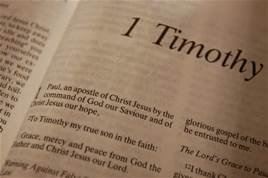Archive
My Commentary on First Timothy 1
 The epistles to Timothy are among my favorite books in the Bible. In fact, I do not believe enough teaching is done on them in churches perhaps due to the fact that most see them as being written to a pastor who how to conduct his ministry. However, there is a lot of doctrine in these letters. Not to mention, these instructions can be useful to all of us—after all we have a ministry whether paid or not, big or small. We are all charged with the responsibility of sharing the Gospel of Jesus Christ.
The epistles to Timothy are among my favorite books in the Bible. In fact, I do not believe enough teaching is done on them in churches perhaps due to the fact that most see them as being written to a pastor who how to conduct his ministry. However, there is a lot of doctrine in these letters. Not to mention, these instructions can be useful to all of us—after all we have a ministry whether paid or not, big or small. We are all charged with the responsibility of sharing the Gospel of Jesus Christ.
So since I do not hear a lot of teaching on these epistles, I thought I’d do my own.
Timothy 1:1-2
Verses 1 and 2 give us both the author, Paul, and the addressee of the letter, Timothy. Paul, again reaffirming his apostleship and stating he is an apostle “by the commandment of God our Savior and the Lord Jesus Christ, our hope.” Paul called Timothy his true son in the faith. Apparently, Timothy was led to Christ by Paul and has been a faithful disciple of Paul ever since.
To his son, Paul, opened his letter with a benediction (or blessing). He pronounced “grace, mercy, and peace” to him which only comes from God our Father and Jesus Christ, our Lord. In this benediction, he reminded Timothy that his real Father was God (who would supply all he needed) and that Jesus Christ was Lord.
1 Timothy 1:3-11
Apparently while Paul was in Ephesus there were those who were preaching other doctrine, doctrine that was contrary to the doctrine Paul had taught them. As a result, when he was called away, he urged Timothy to remain and confront them and give instruction to the congregants not to receive such teaching. These false doctrines included “fables” (untrue accounts) and “endless genealogies” (disputes on lineages of people and possibly of Christ himself). This doctrines lead to disputes that are profitless. They are designed to tear down the body and not build it up. What builds up the body—trusting in God and living in that trust—just as Abraham did.
True doctrine is to unify not divide. Division comes when people attempt to put their own spin on what God has said. But when we listen to the Spirit to understand the true meaning of the word, we will be unified. Just as it is written in Ephesians: “There is one body and one Spirit—just as you were called to the one hope that belongs to your call— 5 one Lord, one faith, one baptism, 6 one God and Father of all, who is over all and through all and in all (Ephesians 4:4-6, ESV).”
So what is the purpose of the law and doctrine: love. Many don’t believe that but love is the essence of the Christian faith. Mainly because we do no demonstrate it but Jesus said that the demonstration of our love for one another will be the way we show that we are His disciples. We are to manifest love that comes from a “pure heart, a good conscience, and a sincere faith.” When we abide in Christ, His love is manifested in and through us. Unfortunately, many church members do not demonstrate love but selfishness, self-righteousness, and jealousy. Those who manifest these behaviors are like those Paul talks about who have strayed from the faith and turned aside to things that do not edify the Body or glory Christ.
Paul said they want to be teachers of the law but they don’t understand what they teach or affirm. When I think about the churches in America, I am reminded of this statement. Many of the largest churches in America are led by people who do not teach God’s Word of repentance and salvation but a social gospel (I’m Ok, you’re OK) or a prosperity gospel (where God’s favor equals material blessings). These take scriptures out of context and do not hold the Law of God in any esteem. Instead they esteem the goodness of man and the value of worthless, earthly things. However, the Law of God was not done away with just because Christ came.
Christ came to fulfill the Law but those who are apart from Christ are still under the Law. Only those who have accepted Christ as Savior have been forgiven and are not under the Law (John 3:16-17, Romans 3:19, Galatians 4:4-5). And those who are under the Law, whether they recognize the Law or not, will be judged by the Law (Romans 2:12).
So what does Paul say about the Law and doctrine? It is good if it is properly applied. The Law is our schoolmaster. It sets the boundaries of how far we can go. To those who keep the Law, the Law means nothing. Think of a person who never drives. Does a speed limit sign mean anything to him or her? The Law is only a bully to those who refuse to keep it—the rebel, the sinner, whom Paul name: “those who kill their fathers and mothers, for murderers, for the sexually immoral and homosexuals, for kidnappers, liars, perjurers and for whatever else is contrary to the sound teaching”.